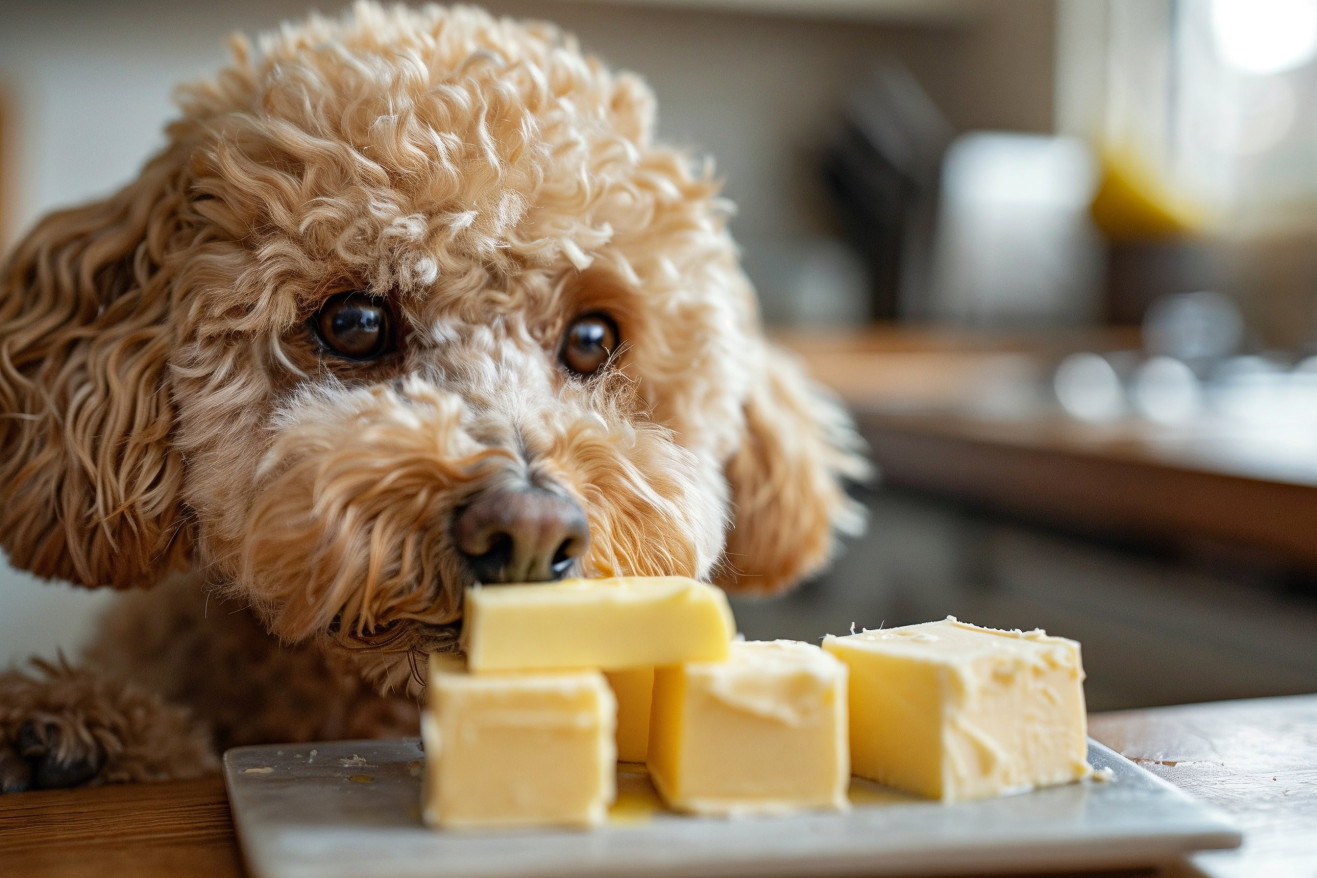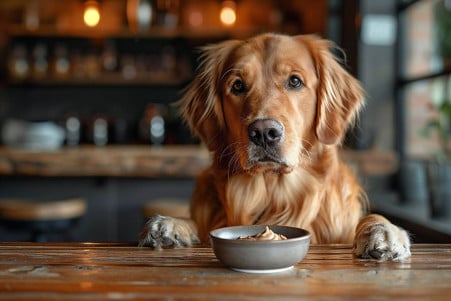Can Dogs Eat Butter? Breaking Down the Dangers
21 March 2024 • Updated 31 March 2024

Despite being a seemingly innocent indulgence for your dog, butter's high fat content and lack of nutritional value can actually be harmful to your pet. Butter is hard for dogs to digest and can cause pancreatitis, obesity, and other health problems if it's consumed in large quantities - so it's probably best to keep this dairy product to yourself.
That said, many concerned dog parents want to know more about why butter is bad for dogs. In this article, we'll take a deep dive into the most recent veterinary studies and expert opinions to explain the potential risks. By exploring the impact of fats, dairy, and harmful additives on a dog's digestive system and health, you'll be able to better understand what you should and shouldn't include in your dog's diet.
Is butter bad for dogs?
The Fatty Makeup of Butter and How It Affects Dogs
The high saturated fat and calorie content in butter can be hard for dogs to digest. According to MasterClass, this can cause pancreatitis in dogs, which is a severe and potentially life-threatening condition. Symptoms of pancreatitis include vomiting, diarrhea, abdominal pain, lethargy, and loss of appetite. If a dog has eaten a lot of butter, it's important to get in touch with a vet immediately so that they can get the proper medical care.
In the long term, eating too much butter can also cause gastrointestinal issues like vomiting and diarrhea in dogs, according to Fetch Pet. The high fat content can also lead to weight gain and obesity, which can cause other health problems like joint pain, diabetes, and heart disease, says Maven's blog. While small amounts may not have an immediate impact, the long-term impact of eating butter regularly can be harmful to a dog's health.
Dairy and Lactose Intolerance in Dogs
Butter is a dairy product, so it can cause gastrointestinal upset in dogs, especially those that are lactose intolerant. According to Hill's Pet, eating butter can cause vomiting, diarrhea, bloating, and abdominal pain in dogs that are lactose intolerant.
The Whole Dog Journal says that even though some dogs may be able to eat butter in small amounts, it's probably best to avoid it altogether because of its high fat content, which can be hard for dogs to digest. For dogs with sensitive stomachs or lactose intolerance, plant-based oils or fats may be a better choice.
Safe Amounts and Occasional Treats
Although butter is not something you should feed your dog, some animal nutritionists say that small amounts of butter on an occasional basis may be safe. According to DogTime, butter is not toxic to dogs, and if a dog ingests a small amount, they will probably be OK, although they may experience some minor digestive issues. The Pure Pet Food site recommends a safe amount of butter for dogs is a teaspoon or less, and it should only be given as a treat.
Larger dogs may be able to handle a little more butter than smaller dogs, but it's still best to avoid feeding butter to any dog on a regular basis or in large amounts. As Pure Pet Food notes, consuming a lot of butter or other fatty foods can lead to obesity and increase the risk of pancreatitis. That said, for dogs that can handle small amounts of butter, it may be OK to give them butter as an occasional treat if it's used sparingly.
Better Fat Options for Dogs
While butter is not a good option, dogs do require healthy fats in their diet to support their energy and overall health. As stated by Dogs Naturally, saturated fat from factory farmed, grain-fed animals can cause a number of health issues including changes in gut bacteria, inflammation, and behavioral problems. Instead, Rogue Pet Science suggests that better fat options include monounsaturated fats from plant-based sources like olive oil, avocados, and nuts.
Dogs also require omega-3 fatty acids from fish oil, flaxseed, and chia seeds, which are anti-inflammatory and support heart, liver, and brain health, according to Dogs Naturally. By rotating through different fat sources, dogs can get a good mix of essential fatty acids. Balanced Canine recommends feeding dogs fatty fish like salmon, herring, and mackerel at least twice a week, as well as including plant-based oils, seeds, and eggs.
Working with a vet or canine nutritionist can help you determine the right amount and kinds of fats for your dog's specific needs, according to Dog Food Advisor. By including these better fat options, you can make sure your dog is getting the essential nutrients they need without the potential harm of too much butter.
How to Treat Butter Toxicity in Dogs
If your dog has eaten a large amount of butter, you should watch for symptoms and take your dog to the vet if you notice anything concerning. According to Fetch Pet, symptoms of butter toxicity include vomiting, diarrhea, abdominal pain, loss of appetite, and lethargy.
The Whole Dog Journal explains that if a dog has eaten a large amount of butter, the vet may recommend immediate treatment or suggest watching the dog at home for signs of gastrointestinal distress. Treatment can include anti-nausea/vomiting drugs, dietary modifications, IV fluids, and observation. Per the Pet Poison Helpline, the prognosis for butter toxicity is usually good with prompt and proper care.
Everything in Moderation and Better Options
Butter is high in saturated fat and not nutritionally valuable like other fatty oils, so it is not recommended for dogs, according to The Dog People by Rover.com. If a dog has ingested butter, they should be okay, but it is best to avoid feeding butter to dogs in the future. If a dog has eaten a whole package or container of butter, they will likely have an upset stomach for a few days and may experience diarrhea, but they should be back to normal within a day or two.
While butter is not toxic to dogs, it is not recommended for them and can pose health risks due to its high fat content, according to The Farmer's Dog. Butter is approximately 80% fat, most of which is saturated fat, and it is not very nutritionally valuable for dogs. The fat content can contribute to obesity, and eating too many table scraps can lead to pancreatitis in dogs. In addition, butter is a dairy product, so it can cause digestive issues in dogs that are lactose intolerant.
Butter is not toxic to dogs, but it is not good for them, according to PetMD. Consuming treats and other foods that contain butter can be detrimental to a dog's health and lead to pancreatitis. Butter is high in saturated fat and low in nutritional value. It can also contribute to obesity and the health problems associated with it, such as hip and joint issues. Dogs can also be lactose intolerant, so the butter may cause an upset stomach.
Closing Considerations: The Hazards of Butter for Dogs
While butter is not toxic to dogs, it is not recommended due to its high fat content, lack of nutritional value, and potential health risks, including pancreatitis, obesity, and digestive issues.
It is best to avoid feeding butter to dogs entirely or to limit it to very small amounts on rare occasions. Instead, healthy fats from fish oil, plant oils, and seeds can provide essential nutrients without the risks.


